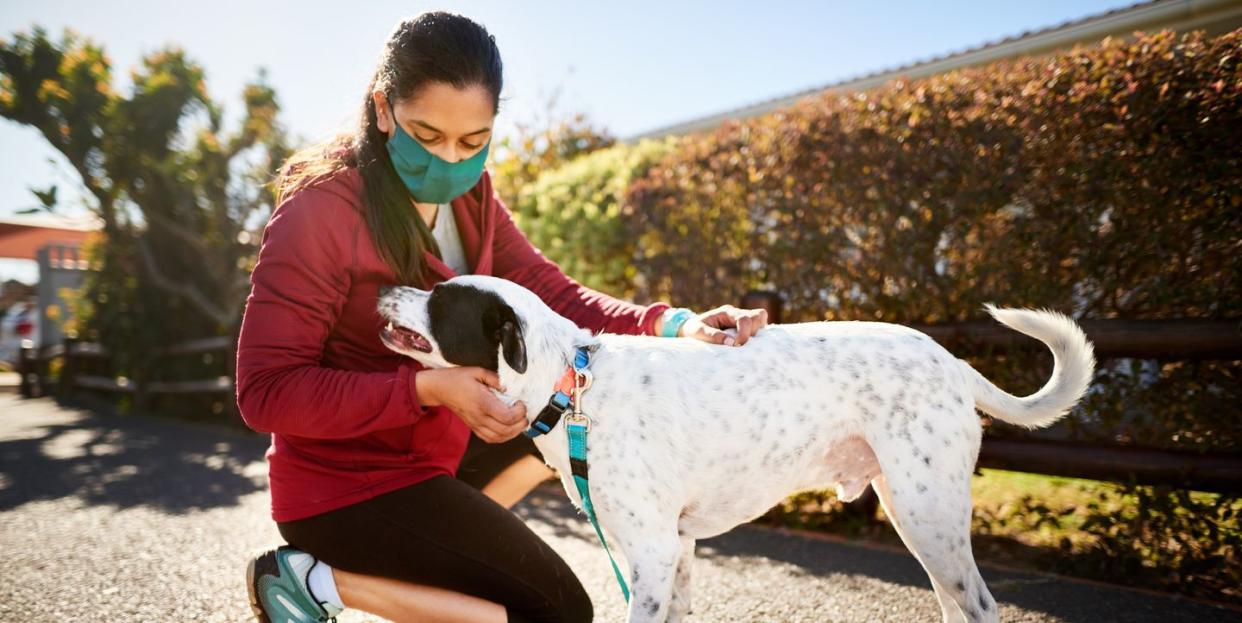How to Keep Your Dog, Cat, and Other Pets Safe From COVID-19

As you keep your distance from fellow humans to prevent the spread of COVID-19, it’s only natural to wonder whether your pets are also safe. Unfortunately, evidence shows that cats, dogs, and other animals can contract SARS-CoV-2, the novel coronavirus responsible for COVID-19.
In August, the first dog to test positive for COVID-19 in North Carolina died after showing signs of respiratory distress, ABC News reported. A member of the dog’s family had tested positive for COVID-19, but later tested negative. Amid the early stages of the pandemic, a dog in Hong Kong also tested “weakly” positive for the novel coronavirus. Many experts believed the dog was only superficially contaminated, meaning the highly-sensitive tests picked up low levels of the virus in the animal—not enough to warrant the diagnosis of an active COVID-19 infection.
Back in May, two cats from New York were the first pets to test positive for SARS-CoV-2, according to the United Stated Department of Agriculture (USDA) and the Centers for Disease Control and Prevention (CDC). The cats, living in different parts of the state, experienced mild respiratory symptoms, per an official statement.
While it’s believed that COVID-19 originated from an animal source (presumably bats), breathe a sigh of relief: The USDA, CDC, World Organization for Animal Health, and American Veterinary Medical Association (AVMA) all say there is no evidence that pets play a role in spreading the virus to people.
However, cats do seem to be susceptible to the virus. In one of the New York cats, no humans in its home had a confirmed case of COVID-19. “The virus may have been transmitted to this cat by mildly ill or asymptomatic household members or through contact with an infected person outside its home,” the statement read. The second cat’s owner did test positive for COVID-19 before the animal started showing any signs of illness.
Eight tigers and lions have also tested positive for SARS-CoV-2 at the Bronx Zoo in New York City after being infected by an asymptomatic staff member. The zoo confirms that all of the cats are doing well and behaving normally. What’s more, research out of China found that cats in Wuhan, China have also been affected. Nearly 15% of the 102 cats in the study tested positive for novel coronavirus antibodies, indicating a prior infection.
Another study published in April found that “SARS-CoV-2 replicates poorly in dogs, pigs, chickens, and ducks, but ferrets and cats are permissive to infection.” SARS-CoV-2 infections and deaths have been reported in mink, which are closely related ferrets, on farms in the Netherlands, Denmark, Spain, and U.S.
Dogs and cats can also contract other types of coronavirus.
There are seven different coronavirus strains known to infect humans, and several others that can infect animals. Dogs can contract a strain of coronavirus known as canine enteric coronavirus, which can cause mild gastrointestinal illness, particularly in puppies.
Another strain, canine respiratory coronavirus, causes an upper respiratory infection that leads to coughing, sneezing, and nasal discharge, according to the AVMA. It’s part of a group of viruses and bacteria associated with canine infectious respiratory disease, a.k.a. “kennel cough.”
Feline coronavirus is a common viral infection in cats that can cause mild diarrhea, according to the Cornell University College of Veterinary Medicine. But again, none of these strains of coronavirus cause COVID-19.
How can I keep my pets safe from the novel coronavirus?
Until more studies are done and experts have a better understanding of how SARS-CoV-2 impacts pets, the CDC recommends taking extra precautions, especially outdoors:
Do not let pets interact with people or other animals outside the household.
Keep cats indoors when possible to prevent them from interacting with other animals or people.
Walk dogs on a leash, maintaining at least six feet from other people and animals.
Avoid dog parks or public places where a large number of people and dogs gather.
Do not put a mask on pets, which can be harmful.
Can I still be around my pet if I have COVID-19?
The CDC still says you should distance from your pets if you do get sick with COVID-19—“just like you would with people,” the agency’s site states.
When possible, you should have someone else care for your pet if you are experiencing coronavirus symptoms (and be sure to pick up extra pet food as you’re stocking up on essentials). If you have to handle your furry friend while sick, the CDC recommends washing your hands well before and after you interact with your pet (while wearing a face mask). Avoid contact with your pet when possible, including touching, snuggling, being kissed or licked, and sharing food.
It’s better to be cautious at this point: “The best advice is for infected people to not be in contact with pets during their quarantine period,” says Linda J. Saif, Ph.D., professor in the Food Animal Health Research Program at The Ohio State University.
Since pets can spread other illnesses to people—such as salmonella and various parasitic diseases—the CDC points out that it’s important to wash your hands after being around animals in general. If you have specific concerns about your pet and coronavirus, call your vet.
Support from readers like you helps us do our best work. Go here to subscribe to Prevention and get 12 FREE gifts. And sign up for our FREE newsletter here for daily health, nutrition, and fitness advice.
You Might Also Like


